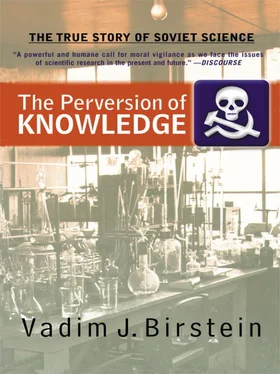Naturally, after this letter the election of Grum-Grzhimailo to full membership in the academy was blocked. 2Fortunately, Grum-Grzhimailo died soon after he wrote this note and escaped the attention of the OGPU forever.
On December 21, 1934, seventeen years after the Bolshevik Revolution, the famous eighty-five-year-old physiologist and academician Ivan Pavlov (1849–1936), wrote a letter to the Sovnarkom: 3
To the USSR Council of People’s Commissars:
…You believe in vain in the all-world revolution… You disperse not revolution, but fascism with great success throughout the world… Fascism did not exist before your revolution… You are terror and violence… How many times did your newspapers write: “The hour [of the world revolution] has come”? The result was that new fascism appeared in different places. Yes, because of your indirect influence fascism will take over step-by-step the whole civilized world, except its mighty Anglo-Saxon part (England, and, probably, the United States), [which] has already introduced the core of socialism—that labor is the main duty and real dignity of a human being, and it is the basis of relationships between people that provides each person with the opportunity to live. They will reach this ideal [socialism] preserving all their precious cultural achievements, which cost many sacrifices and much time…
We have been and are living now in the atmosphere of continuing terror and violence…
Am I alone in thinking and feeling this way?
Have pity on the Motherland and us.
Academician Ivan Pavlov Leningrad, December 21, 1934.
It is amazing how profoundly Pavlov understood the role the Bolshevik regime played in world politics. But Pavlov was alone in his revolt. Because he was the only living Russian Nobel Prize winner, he enjoyed a unique position in Soviet scientific society. His institute had received state support on the personal order of Vladimir Lenin since the takeover. Despite this, at the beginning of the 1930s, the OGPU had five volumes of “operational materials” from informants on Academician Pavlov. 4
The Sovnarkom chairman, Vyacheslav Molotov, to whom I will return several times in this book, answered the academician on January 2, 1935: 5
I would like to tell you my frank opinion that your political views are completely baseless and unpersuasive. For instance, your examples of “civilized states” such as England and the United States… I can only express my surprise that you tried to make categorical conclusions on principal political questions in a scientific area which you, apparently, have no knowledge of. I can only add that the political leaders of the USSR would never allow themselves to use such ardor [Molotov used the very ironic and insulting Russian word retivost ] in questions of physiology, the field in which your scientific authority is without question.
With this, I will allow myself to stop answering your letter.
Chairman of the USSR SNK V. Molotov
I have sent copies of your letter and my answer to President of the Academy of Sciences A. P. Karpinsky.
But Molotov was disingenuous to say that those in political power would never allow themselves to interfere in questions of physiology. At the time Pavlov wrote his appeal, science and scientists had already been thoroughly infiltrated by the Bolsheviks, and the Party constantly intervened in science and scientific matters. By sending copies of Pavlov’s letter and his own answer to President Karpinsky, Molotov evidently expected Karpinsky to restrain Academician Pavlov.
Of course, from the perspective of Bolshevik ideology, the old intelligentsia only had to be tolerated until it could be replaced by newly trained scientists from the ranks of the proletariat. These newcomers would be totally obligated to the system and thus completely compliant. The Bolsheviks used poisonous propaganda to turn the masses against the old intelligentsia, accusing them of being “bourgeoisie,” a concept hard to understand today since the word, which means a middle-class person concerned with materialist gain and conventional morality, describes the majority of people in contemporary developed countries. However, in the 1920s and 1930s in Russia, it resonated for the majority of Russians, who had never had an opportunity to own anything of real value. The “bourgeoisie,” according to Bolshevik ideology, was by nature the main enemy of the working people and should be exterminated. This idea was put in action from the very beginning of the Bolshevik regime—in 1917 and 1918, Russian cities witnessed the massacre of hundreds of educated people by revolutionary sailors and soldiers on the streets.
THE ACADEMY OF SCIENCES: BEGINNINGS
In contrast to Western Europe and the United States, the Academy of Sciences was created in Russia before any of the universities were established. The St. Petersburg (Imperial) Academy was created by Peter the Great in 1725. On December 27, 1725, the first meeting of the St. Petersburg Academy of Sciences and Arts took place, but Peter the Great died before he approved the academy’s governing statutes. Peter’s daughter, Empress Elizabeth, finally approved them on June 24, 1747. On September 30, 1783, on the order of Catherine the Great, a second Imperial Russian Academy was established in St. Petersburg. Functions of the academies were overlapping, with the St. Petersburg Academy in charge of natural and humanitarian sciences and the Imperial Russian Academy in charge only of humanitarian sciences. On October 19, 1841, Tsar Nicholas I ordered the two to merge into one–the Imperial St. Petersburg Academy. The Russian Academy became its Russian Language and Literature Division. The statutes of the St. Petersburg Academy were approved by Nicholas I in 1836 and were in force until 1927. 6The first Russian university opened in Moscow in 1755. In 1917, before the February Revolution, there were forty-four full members of the academy, and the academy had authority over five laboratories, seven museums, the Russian Archaeological Institute in Constantinople (now Istanbul), the Pulkovo Astronomic Observatory, with two departments near St. Petersburg, the Main Physical Observatory of the Meteorology Service, and twenty-one scientific commissions. 7
Members of the academy enjoyed very high status in Russian society. Academicians received the title of tainyi sovetnik (privy councillor), which was equivalent to the rank of general in the army. In 1727, the eleven founding members introduced three categories of membership: adjunct or assistant academician for junior scholars with potential; ordinary (or full) member; and extraordinary academician. In 1759, the additional title of corresponding member was added for members who lived outside St. Petersburg. There were also foreign and honorary members. In 1917, there were forty-four academicians and a staff of 176 members. 8Historians and linguists were most numerous (twenty-four members), followed by biologists (seven), geologists (four), mathematicians (four), and chemists (three). There was also a physicist, an astrophysicist, a meteorologist, and an economist. 9The majority of academicians were university professors and continued their university careers after their election to the academy. 10
In 1917, before the revolution, the academy included many internationally known scientists. The majority were specialists on history and linguistics, but there were also prominent natural scientists. The physiologist Ivan Pavlov was the most famous. In 1904, he was awarded the Nobel Prize for his study of nervous mechanisms controlling the digestive glands. His surgical experiments created a new scientific discipline—physiology. Pavlov’s book Lectures on the Work of the Digestive Glands, published in Russian in 1897, was immediately translated into German, French, and English. 11As one of his devoted students, Professor Boris Babkin, wrote, “[A]fter 1898—the date when the German translation of Pavlov’s book appeared—every physiologist and every clinician based his study of the normal and abnormal physiology of the alimentary canal on Pavlov’s Lectures .” 12
Читать дальше











